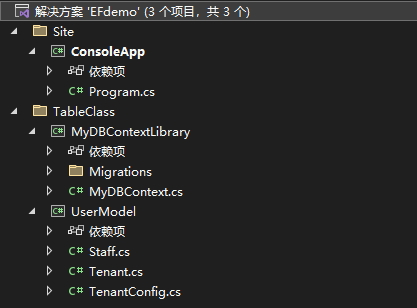- A+
1、简介
EFcore,可用使得开发人员不需要再去关注数据库的实现,全都由代码进行生成
这样有利于减少工作量、数据库快速迁移...
2、上手搭建架构

(这个图是做完本章内容的完整图,我们一步步深入即可)
在写EF之前,先安装好数据库,我选择在本地安装Sqlserver
我们先执行最核心的两步,将EF和数据库跑通
1)类&表的定义:基本上会保持class和数据库的table字段保持一致,如上UserModel,我定义了Staff、Tenant两个类,会自动生成两个表
UserModel需要安装
Microsoft.EntityFrameworkCore.SqlServer
Staff
using System.ComponentModel.DataAnnotations; using System.ComponentModel.DataAnnotations.Schema; namespace UserModel { public class Staff { public int Id { get; set; }public string Name { get; set; } public string Description { get; set; } public string? PhoneNumber { get; set; } public string? Email { get; set; } } }
Tenant
namespace UserModel { public class Tenant { public int Id { get; set; } public string Name { get; set; } public string Description { get; set; } } }
2)上下文定义:负责关联实体类、访问数据库配置,提供后续生成数据库支持,如上MyDBContextLibrary
MyDBContextLibrary需要安装
Microsoft.EntityFrameworkCore.Tools
MyDBContext
using Microsoft.EntityFrameworkCore; namespace UserModel { public class MyDBContext : DbContext { public DbSet<Staff> Staffs { get; set; } public DbSet<Tenant> Tenants { get; set; } protected override void OnConfiguring(DbContextOptionsBuilder optionsBuilder) { base.OnConfiguring(optionsBuilder); optionsBuilder.UseSqlServer("Data Source=.;Initial Catalog=master;Integrated Security=True;TrustServerCertificate=yes"); } } }
准备完毕!!
打开【程序包管理器控制台】
项目指定到MyDBContext

Add-Migration Ini #添加一个迁移 Ini是为这个迁移起的备注名 Update-database #更新到数据库,执行了才会同步迁移到数据库
到此,简单的EF框架已经跑起来了
3、扩展
EF是一个十分强大的框架,我们逐渐扩展知识点。
1)属性定义
有两种方式
其一:Data Annotations(数据注解),利用特性进行定义,如对Staff属性进行定义
using System.ComponentModel.DataAnnotations; using System.ComponentModel.DataAnnotations.Schema; //Data Annotations例子 namespace UserModel { [Table("Staff")]//可用加特性指定表名 public class Staff { public int Id { get; set; } [Required]//必填 [MaxLength(10)]//最大长度为10 public string Name { get; set; } [Required] public string Description { get; set; } public string? PhoneNumber { get; set; } //可空 public string? Email { get; set; } } }
PS:提醒一点,Id / 类名+Id 在迁移到数据库表的时候,会默认为递增序列
其二:Fluent API,微软官方提供的API,如对Tenant属性进行定义
在MyDBContext,重写OnModelCreating方法
using Microsoft.EntityFrameworkCore; namespace UserModel { public class MyDBContext : DbContext { public DbSet<Staff> Staffs { get; set; } public DbSet<Tenant> Tenants { get; set; } protected override void OnConfiguring(DbContextOptionsBuilder optionsBuilder) { base.OnConfiguring(optionsBuilder); optionsBuilder.UseSqlServer("Data Source=.;Initial Catalog=master;Integrated Security=True;TrustServerCertificate=yes"); } protected override void OnModelCreating(ModelBuilder modelBuilder) { base.OnModelCreating(modelBuilder);modelBuilder.Entity<Tenant>().Property(x=>x.Description).IsRequired(false); /*指定Description非必填*/ } } }
当然,我们容易看到,如果实体很多,属性直接写在这里代码太冗长了
改变一下方法,添加一个TenantConfig类
using Microsoft.EntityFrameworkCore; using Microsoft.EntityFrameworkCore.Metadata.Builders; namespace UserModel { public class TenantConfig : IEntityTypeConfiguration<Tenant> { public void Configure(EntityTypeBuilder<Tenant> builder) { builder.ToTable("Tenant");//可重新指定表名 builder.HasKey(x => x.Id); builder.Property(x=>x.Name).IsRequired().HasColumnType("nvarchar(100)"); builder.Property(x=>x.Description).IsRequired(false); } } }
然后 DbContext:
using Microsoft.EntityFrameworkCore; namespace UserModel { public class MyDBContext : DbContext { public DbSet<Staff> Staffs { get; set; } public DbSet<Tenant> Tenants { get; set; } protected override void OnConfiguring(DbContextOptionsBuilder optionsBuilder) { base.OnConfiguring(optionsBuilder); optionsBuilder.UseSqlServer("Data Source=.;Initial Catalog=master;Integrated Security=True;TrustServerCertificate=yes"); } protected override void OnModelCreating(ModelBuilder modelBuilder) { base.OnModelCreating(modelBuilder);modelBuilder.ApplyConfigurationsFromAssembly(typeof(Tenant).Assembly); //利用反射,加载Tenant程序集下的IEntityTypeConfiguration } } }
完成,再次生成一个迁移到数据库看看!!!
代码不会一步到位的,大家逐步测试严重,这边我就不贴数据库的截图了
4、最后说明一下ConsoleApp
Program
using UserModel; using(var ctx = new MyDBContext()) { var s = new Staff() { Name = "kxy2", Description = "三好员工", PhoneNumber = "1234567890" }; ctx.Staffs.Add(s); var t = new Tenant() { Name = "ccc", }; ctx.Tenants.Add(t); ctx.SaveChanges(); } Console.ReadLine();
测试数据而已,怎么方便怎么来
PS:有个点,如果设置ConsoleApp为启动项,迁移的时候会验证启动项的依赖,从而产生错误
ConsoleApp需要安装
Microsoft.EntityFrameworkCore.Design
至此,完成!!
感谢关注




